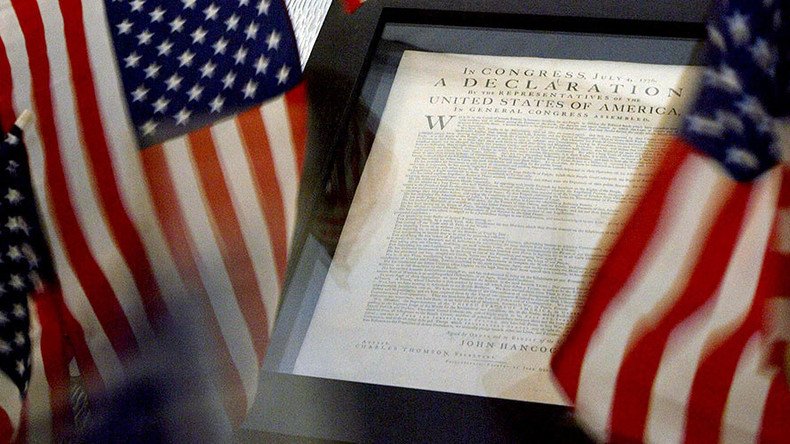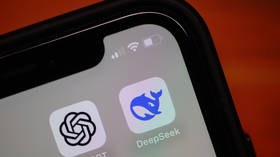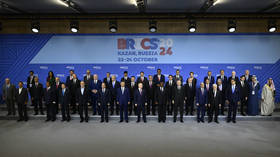5 ‘myths’ about Independence Day exposed by American dissidents

For most Americans, July 4 is a time for patriotism, BBQ and fireworks. Yet some of the country’s most outspoken dissidents have denounced the holiday and what it represents.
As official history goes, the thirteen American colonies signed their Declaration of Independence on July 4, 1776, pushing through their own 'Brexit' from the English king.
However, not all Americans have felt the freedom instilled by the iconic document’s promise of “life, liberty and the pursuit of happiness,” particularly with the world’s highest incarceration rate and millions of poor and hungry children.
Happy 4 July, American friends!!#July4th#Brexitpic.twitter.com/xlxRTFBvYw
— David Patrikarakos (@dpatrikarakos) 4 июля 2016 г.
On #July4th, join us to stand up for #privacy -- say no to global warrants! #Rule41https://t.co/CHQ3OaRlVCpic.twitter.com/uPSAgKt89f
— Access Now (@accessnow) July 4, 2016
America was not founded primarily on Christian ideals, nor great ideas, rather torture. 😥 #fourthofjulyhttps://t.co/dFKhKfABH0
— Fred Sprinkle (@fredsprinkle) June 25, 2016
Happy 4th of July! Now let's take back our government from the 2 corporate political parties https://t.co/u1twgr97o8pic.twitter.com/oyaoq1sver
— Dr. Jill Stein (@DrJillStein) July 4, 2016
Several American dissidents have criticized the hero-worshipping of the Founding Fathers and their values. Here is why they think Americans shouldn’t celebrate on July 4.
1) The Founders were heroic men
According to Boston University professor Howard Zinn (1922-2010), a self-described “democratic socialist” and author of ‘A People’s History of the United States,’ the Founding Fathers were actually far from being heroes.
“Our ‘Founding Fathers’ were horrible, horrible people. We must accept this historical absolute truth, if we ever wish to move beyond it. They were incredibly racist, misogynist, classist, unapologetic exploiters of the common working person,” he said in 2009, during a famous lecture ‘Myth of the Good Wars.’
Zinn maintained that the Founders were rich elites, interested in achieving American independence not for the people to be free, but to make themselves even richer.
2) The Declaration of Independence was put into practice
Zinn also called out the Founding Fathers for initiating the “worst genocide in all of human history,” which resulted in the deaths of up to 100 million Native Americans.
Native American genocide, Trans-Atlantic Slave Trade, The Holocaust. ~100 million murders in the name of Christ. https://t.co/ShNYTPFVau
— Lil IntroVert (@TrapBasquiat) June 12, 2016
Good European Christian colonizers wiped out entire native genetic strains. The real genocide. 100
— Sankrant Sanu सानु (@sankrant) April 1, 2016
million people. https://t.co/kDhlr1KuKg
Contrary to popular belief, not all Native Americans fought with Britain’s King George III. Many sided with people in the Colonies, or avoided the conflict.
Many of those who did fight on the British side did so with the hope of saving their own homelands.
Three Horses (1905). / Native Americans By Edward S. Curtis (1890s-1900s) (14 photos) https://t.co/qI2kVakAehpic.twitter.com/lit1MO7Sr7
— Old Pics Archive (@oldpicsarchive) July 4, 2016
Contrary to popular belief, not all Native Americans fought with Britain’s King George III. Many sided with people in the colonies, or avoided the conflict. One of the reasons the colonists were rebelling was that the crown forbade any settlement of Native American lands west of the Appalachian Mountains in 1763.
Zinn also challenged the notion that the signatories of the Declaration were in favor of democracy, arguing that they favored a republic and were openly anti-democratic.
Calling the American system “the most ingenious system of control in world history,” Zinn credited this to the country’s origins.
“The pretense continued over the generations, helped by all-embracing symbols, physical or verbal: the flag, patriotism, democracy, national interest, national defense, national security,” he said.
3) America was founded on Christian principles
One of my favorite Thomas Jefferson quotes pic.twitter.com/KIE0VLaOOE
— Chase Arnold (@ChaseAArnold) June 22, 2016
Thomas Jefferson, considered the main author of the Declaration of Independence, had religious views unlike most Christian patriots of his era – and today.
Jefferson was considered something of an outcast among his peers, who insisted that America was founded on Christian principles.
— Dolores Martyn (@DoloresMartyn) July 4, 2016
While Jefferson was intellectually interested in theology, he was reluctant to speak personally about religion. He did, however, write that the First Amendment of the US Constitution – forbidding Congress from establishing a state religion – built a “wall of separation” between church and state.
Why do American schoolchildren and new citizens pledge allegiance to the Flag and “one nation, under God,” then? The Pledge of Allegiance has nothing to do with the Founding Fathers – it was written in the 1880s and only became official in 1942. The words “under God” were added to the Pledge in 1954 by Congress, after a campaign by the Knights of Columbus
4) Liberty for all
Chris Hedges: Mumia Abu-Jamal's #FourthofJulyhttps://t.co/1BbSblEIxy#freemumia@ChrisLynnHedgespic.twitter.com/877XySY7YG
— Truthdig (@Truthdig) July 4, 2016
By the same token, the words “liberty and justice for all” come from the Pledge, not from the Declaration of Independence. Another American dissident, Mumia Abu-Jamal, has been sharply critical of the notion.
“We live in one of the most un-free systems on Earth,” Abu-Jamal told Truthdig ahead of the July 4 holiday. “Where is this American freedom they keep telling us about? I don’t see it. Black folks are more in danger, and being killed in even greater numbers, than during the reign of terror that was lynching and Jim Crow.”
The Black revolutionary, writer, and former Black Panther has spent more than 30 years in prison for the killing of a Philadelphia police officer, much of it in isolation on death row.
READ MORE: Police killed over 1,100 people in US in 2015
Amnesty International has long called on the US government to end the practice of solitary confinement. The human rights organization has also called for a new trial for Abu-Jamal.
READ MORE: Pennsylvania lawmakers sued over bill that silences prisoners
5) The Declaration of Independence was signed on July 4
Happy #FourthofJuly to the USA! Here's an 1856 print of the Declaration of Independence https://t.co/RHzivqp4cXpic.twitter.com/f9yudnqaKT
— British Museum (@britishmuseum) July 4, 2016
Perhaps one of the greatest misunderstandings surrounding the holiday is the date itself.
The Second Continental Congress adopted the Declaration of Independence on July 4, 1776, but it took two weeks to write out the text on parchment. Most of the delegates signed the document on August 2. Five of the delegates signed it at a later date, and two – John Dickinson and Robert R. Livingston – never signed it at all.
More on Jefferson's rough draft #DeclarationofIndependence#July4th#IndependanceDayhttps://t.co/aZYcfYiYdMpic.twitter.com/Jp0jrZPl1c
— Library of Congress (@librarycongress) July 4, 2016
Philadelphia’s Liberty Bell, the iconic symbol of American Independence, never rang on July 4, nor did the excitement over this event cause it to crack. That legend comes from a fictional story called "Ring, Grandfather, Ring," written by George Lippard of Philadelphia in 1847.
Though schoolchildren still tap the bell gently 13 times every July 4, there is no proof that it actually rang at any point in July 1776.
Poor casting doomed the famous bell years before; it first developed a crack in 1752 and had become mute by 1846.













